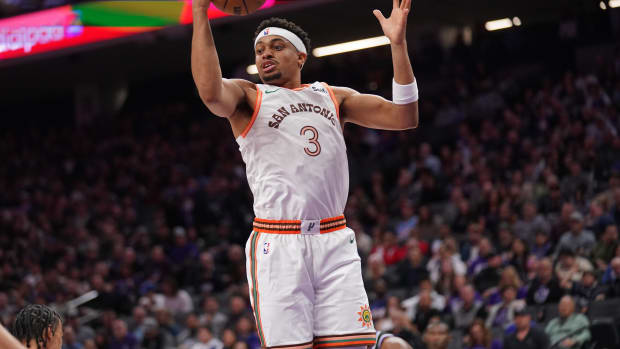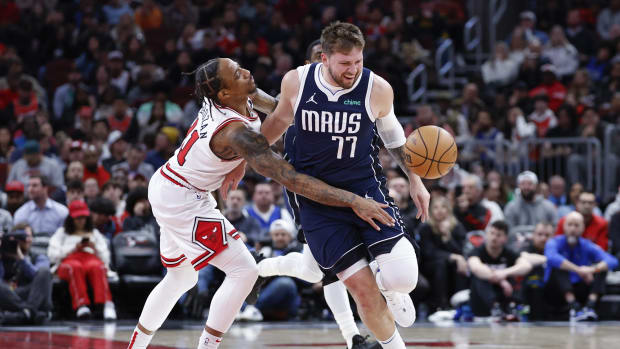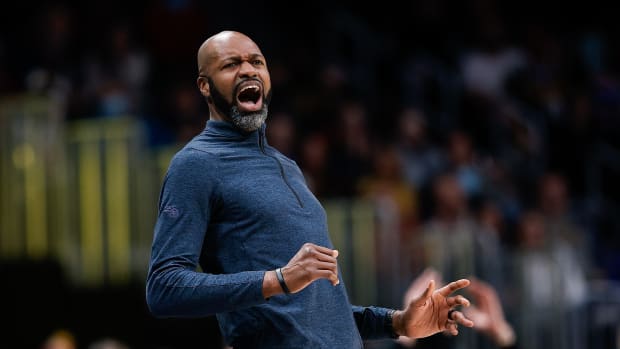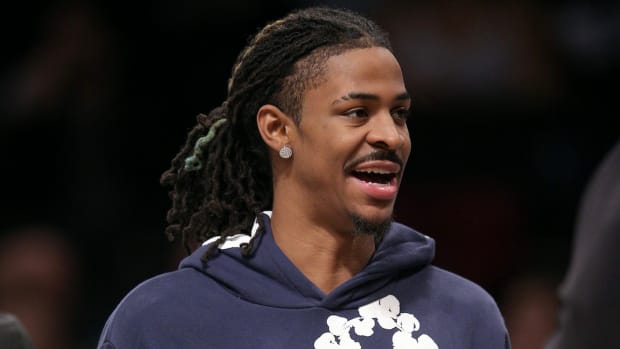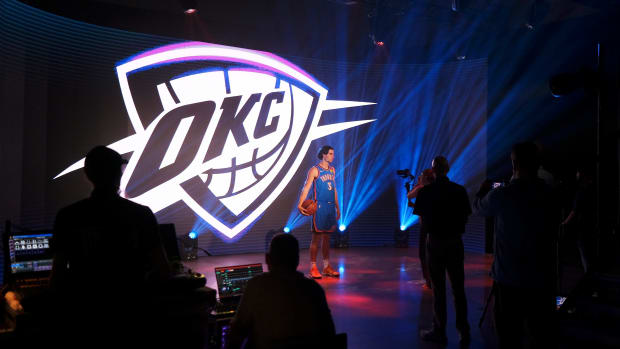Giants of Africa: Masai Ujiri's Summer of Going Back and Giving Back
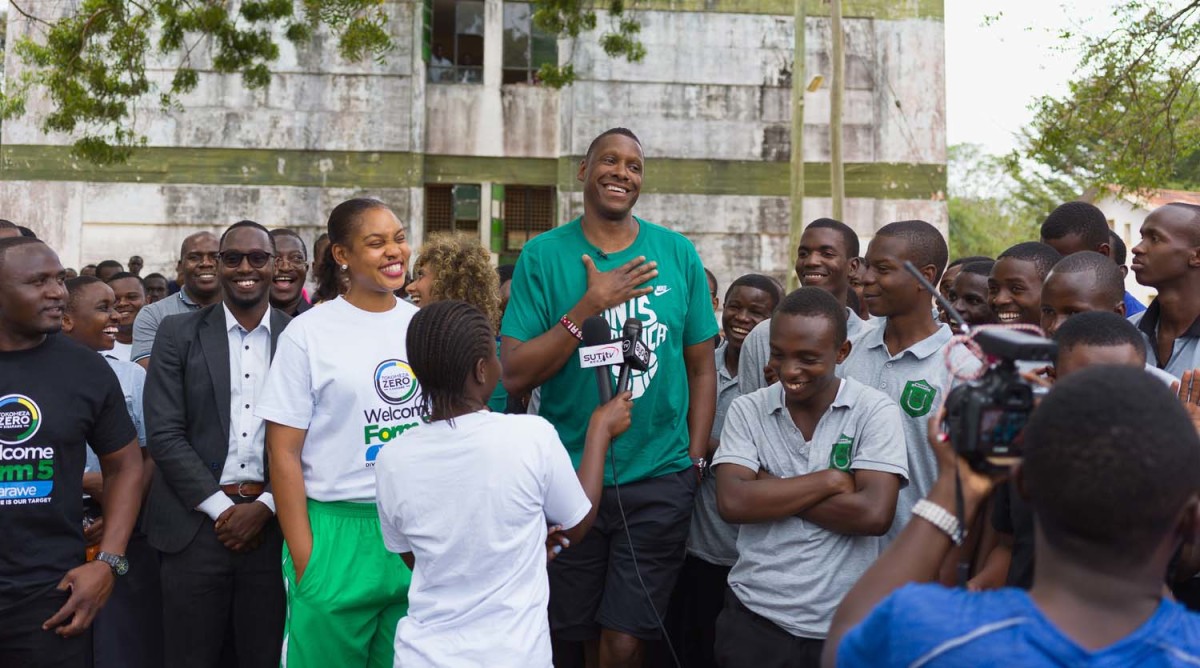
I founded Giants of Africa in 2003. In the beginning, the goal was to uncover talent. I was saying to myself, "How do we find the next Hakeem Olajuwon?" Back then I was a scout for the Nuggets. That first camp we hosted was in Nigeria, my home country. We used baby blue Denver gear for all the campers. Kiki Vandeweghe was our GM at the time, and he told our equipment manager to get me the cheapest shorts and practice jerseys we had, so that we could get as many uniforms as possible. And then we needed shoes, so we put a giant bin in the middle of the locker room. Carmelo Anthony, Kenyon Martin, Marcus Camby—they all gave me shoes by just throwing their old ones into the bin.
The next year, before we went back, Camby asked how many shoes we needed. Between players and the coaches, I guessed about 75 pairs. So Camby called And1, and a few days later I come home to three giant boxes in front of my house. We had 80 pairs of shoes. Of course, I had no way to ship them. So each coach traveling with us that summer was packing every bag full of And1 shoes, praying their luggage didn't get lost.
Now we work with Nike, and it's all Nike everything—shoes, socks, full uniforms. They tried to ship hijabs for the women in our Somalian camp this summer, but those got stolen. It was the heartbreak of the summer. Can you imagine what that would have looked like? Fifty Somali women, head-to-toe in brand new gear, all wearing these Nike hijabs. Instead, the girls brought their own hijabs. We still went out and had a great time.
After a few years of running camps, the mission began to get bigger than basketball. At each camp we were hosting the best 50 players in any given country. But obviously, out of 50 players at a camp, 49 are not making it to the NBA. So what happens to them?
We started teaching that there's more than what happens on the court—there's a whole ecosystem. The management side. Journalism. Medicine. Psychology. There are so many things that you can do with sports. So how do we start conveying that to the kids? That you can be a part of this game at the highest level even if you don't play. For instance: I didn't play in the NBA!
It's important to have examples of success for the kids to see. Godwin Owinje scouts for the Detroit Pistons and Astou Ndiaye works at the NBA Academy in Africa. With us, the Raptors, Sarah Chan is a scout. Patrick Mutombo is a coach for the Raptors, and he's one of the best assistants in the NBA. He's from the Congo. Jama Mahlalela, he's the coach of our NBA G-League team, Raptors 905. He's from Eswatini. Patrick Engelbrecht, another scout for the Raptors, is from South Africa. There are a lot of African guys who have come to the West and succeeded in basketball. Even if the NBA doesn't work out, there are options all over sports.
And life skills. We try to teach camaraderie and working together. Being on time. Being honest. Respect for women. We tell kids to focus on the simple things: Be a leader to your little brother. Or at school. Or at work. You have to set a tone: bold, but respectful. Be confident in who you are and where you come from. And as you start to grow, don't be afraid to be a great follower. A lot of great followers have become really good leaders.
Once those lessons became part of the mission, it got even more fulfilling for us. Then we started to build courts in areas where we could help, and that became part of the mission, too. It's all about outreach. Whether it's tough slums or refugee camps or places where we wanted to affect more women. GOA can help show the world that those places have good people if you take a positive energy into those environments and work with the right people on the ground.
In Somalia we worked with a woman, Ilwad Elman, who has a foundation and a facility where she works with women and young boy soldiers she's trying to save and rehabilitate. When you're working directly with an organization like that, you feel good about it. The collaboration with her was awesome.
Going back with a championship this summer, the energy was so great—both the energy we were putting in, and the energy we were getting back from everyone we saw. The people there, they understand the NBA and how hard this is. They've seen the disappointments, and they appreciate what the accomplishment means. Now when we talk to camps about winning, we can talk about a championship. That makes it more attainable for the kids. We started like them, sitting on the court the same way they're sitting. If we can grow up and win a championship then they can do it, too.
Between practice sessions we have meetings where we talk about goals. All the kids huddle up into different groups, and we give them each a journal and ask them to write down their goals and their dreams. Short-term goals, long-term dreams. It's awesome to see kids take this part really seriously. Learning how to set goals can help so much more than just basketball.
We held six camps this summer. At some, we had only boys, and others were only girls. Emphasizing women's basketball is important for a few reasons. We want to give these girls the opportunity to build confidence. We want them to learn how to work together. There are so many things in sports that can help open the mind. But the biggest thing is equality. We always say, "Oh, my wife runs my home." Or, "Oh, my daughter, she's so great." Then when it comes to real life, in the workplace, we don't give them the same opportunities. We have to start sending a different message at a young age. And for a continent where those chances don't often exist—in some places women playing is considered blasphemy—we need to go there and show them. Sports can carry that message.
In Tanzania, the girls' all-star game was one of the most incredible basketball games I've ever watched. It was electric. The boys were all off on the side watching, and these girls . . . I don't know how it all happened, but at the end, it started with a three-point shot, then the other team came back with a layup, then it was, bam: a three, a three, layup, layup, three. It was like 14 possessions back and forth and there was maybe one missed shot. I swear to you, it was the same feeling I had during Game 6 in June. It was one of those basketball moments where you're watching and you know you'll never see anything like it again.
Giants of Africa is not political. Once you start indulging in things you're not an expert on, then you begin to fail. But the places I can be a voice through sports, and the places we can take action, we will.
If we can take basketball there to give those kids some reason to be happy, and to feel hope, there's no reason we shouldn't be able to go. I'm African. It doesn’t matter whether there’s been a war. If you're from Toronto, you're always going to go back to Toronto. You know it as the place you grew up, and you'll always go back. That's how I feel about Africa. I'll always want to go back there, and GOA will always want to help however we can. Because if we won't go, then who will?
Giving back, and going back, is part of the culture—from Manute Bol and Hakeem Olajuwon and Dikembe Mutombo to the work of guys like Luol Deng, Luc Mbah a Moute, Serge Ibaka and Pascal Siakam. They're all doing big things for the continent. Manute Bol was one of the guys who taught me to be bold. To be fierce. To speak intelligently, and speak like you belong.
I won't lie. It can be a grind sometimes. But I don't golf. I don't drink. I don't go to happy hours. This is my fun. This is my hobby. Reaching out, getting to know other people's cultures, traveling to other people's countries. Living in Morocco is totally different from living in Rwanda or Ethiopia. Different languages, different food, different religion. So on the first day of each camp we have what we call a "culture day" where the coaches spend time exploring the community. To be honest, I get inspiration from Anthony Bourdain. I think what he did was remarkable, and it's what we want GOA to do with sports. Basketball can be the entry point, but how do they live? What's their culture like? How can we help?
There are millions of kids on the continent who are better than I ever was at basketball, and there are millions who are smarter than I ever was. In my position, I want to help take that narrative to the mainstream. People hear "Africa" and they think about charitable commercials, or safari tours and animals. It's our responsibility to help change that perspective.
The truth is that Africa is like everywhere else. There are poor areas, there are rich areas, there is a middle class. Some of those areas are bigger in one country than another, and some countries have real problems that they're working through. But there's great people, good people and a small percentage of bad people—just like everywhere else.
You have to bring those good people with you. To me, I won't be successful if I'm the only one who makes it here. People always say, "Oh, that's the first African president in all of North American sports." I don't know how to feel about that. Being first is good, but I don't want to be the only one. There have to be more.
It's time to stop thinking of Africa as a charity and start thinking of it as an investment. There are so many wonderful things about it that people in the West don't see. Strictly from a basketball standpoint, the talent level is abnormal. There are tribes where the average height is 6'8". So why don't we think on a grander scale and try to help everyone capitalize? Train coaches. Build facilities. Create jobs. Change communities. That's the mission. Some of these goals will take a long time to achieve, but I know we can get there.
We've already come a long way from the shoe bin in Denver.































